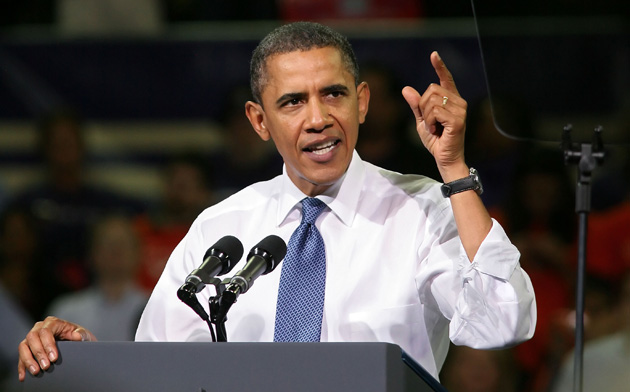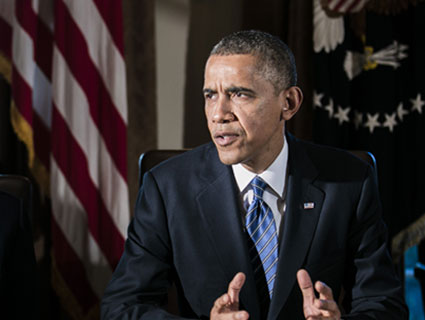
Marcus Donner/Zuma
What happens after we get a deal on the fiscal cliff? If Republicans are to be believed, we’ll just sail right into a second crisis, this time over raising the debt ceiling. They’re insisting that, once again, they’ll refuse to raise the ceiling unless President Obama agrees to massive spending cuts.
We’ll see. But it’s worth pondering what Obama’s options are for simply ignoring the debt ceiling and continuing to spend money regardless of whether Republicans agree to raise it. Several theories have been floating around since the first debt ceiling crisis last year. Here they are:
- The 14th Amendment: Under this theory, the president would simply invoke the 14th Amendment, which says, “The validity of the public debt of the United States, authorized by law […] shall not be questioned.” Bill Clinton thinks this would work, but it strikes me as unlikely. Even if the debt ceiling isn’t raised, the public debt is still valid and the Treasury can continue to pay it. Lots of other spending would have to be cut, but not debt payments.
- The platinum coin: There’s an obscure statute that authorizes the Treasury to mint platinum coins “in accordance with such specifications, designs, varieties, quantities, denominations, and inscriptions as the Secretary, in the Secretary’s discretion, may prescribe from time to time.” Jack Balkin suggests that the secretary of the Treasury could simply mint a $1 trillion platinum coin, deposit it at the Federal Reserve, and then write checks on it. I don’t buy this one either. It’s just too outré. It’s the kind of thing that sounds cute to a blogger tapping away on his laptop, but there’s no way an actual president would ever try anything so obviously childish.
- Priority of legislation: In general, recent legislation overrides older legislation when there’s a conflict. The president could argue that the last debt ceiling increase was passed in August 2011, and that any spending legislation passed since then implies Congress’ consent to raise the debt ceiling. They knew we were running a deficit when they approved the spending, after all. Obama would just have to make sure to fund mandatory programs first (Social Security, Medicare, etc.), since they were authorized decades ago, and then issue new debt only to fund discretionary spending.
- You and whose army? This is the most important argument of all. Regardless of the legal justification, the real question is whether a court would interfere. Many people think the filibuster is unconstitutional, for example, but everyone agrees that it doesn’t matter because no court will ever touch the subject. It’s an internal matter for Congress to decide. This is similar: the debt ceiling is a political argument between two branches of government, not a legal one. Jonathan Zasloff adds a little meat to this argument, suggesting that there’s literally no one with proper standing to sue in the first place.
During the last debt ceiling fight, Obama never suggested he’d resort to unilateral action like this. Partly that’s because he genuinely wanted to make a “grand bargain” on spending, and the debt ceiling fight was pretty good political cover for that. This time he doesn’t, so he might be more likely to try it. However, one interesting question about this is whether he’s ever asked the Office of Legal Counsel for an opinion about any of these theories. If he has, and it was negative, that would probably restrain him. If he hasn’t, he’d probably need to in order to maintain his credibility on the issue. That’s a risk, of course, since there’s no telling what OLC’s lawyers would come up with. There’s a political risk too: Congressional Republicans could go ballistic and become even more obstreperous than they are now. Fun times.
UPDATE: Via Twitter, Brian Beutler reminds me that OLC has given guidance to Obama on the 14th Amendment question. We just don’t know what they said. However, given Obama’s comments at the time, they probably told him no dice.
UPDATE 2: Several people have pushed back on my dismissal of the platinum coin ploy. I’m not a lawyer, but my sense is that this is so wildly contrary to the intent of the law, which was to allow the Treasury to issue commemorative and bullion coins, that a court probably would intervene if the president tried to pull this off. The other ploys are at at least minimally plausible, but this one is banana republic territory.
UPDATE 3: For what it’s worth, I agree that the president’s best option is to simply start shutting down chunks of the government if Congress refuses to raise the debt ceiling. Republicans seem to have convinced themselves that the lessons of 1995 no longer apply, but I think they do. This would be a PR disaster for them. They’d cave before long.
The thing they don’t understand is that Obama wasn’t playing hardball in 2011. He actually wanted a deal, and they were nuts not to take him up on it. This time he doesn’t, and he has the power and the credibility to make sure that Republicans take the blame when national parks get closed and passports stop getting issued.
















